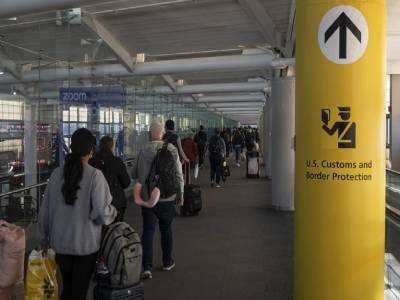
Some conferences have been relocated in response to researchers’ concerns about visiting the United States.Credit: skynesher/Getty
Several academic and scientific conferences in the United States have been postponed, cancelled or moved elsewhere, as organizers respond to researchers’ growing fears over the country’s immigration crackdown.
Organizers of these meetings say that tougher rules around visas and border control — alongside other policies introduced by US President Donald Trump’s administration — are discouraging international scholars from attending events on US soil. In response, they are moving the conferences to countries such as Canada, in a bid to boost attendance.
‘Anxiety is palpable’: detention of researchers at US border spurs travel worries
The trend, if it proves to be widespread, could have an effect on US scientists, as well as cities or venues that regularly host conferences.
“Conferences are an amazing barometer of international activity,” says Jessica Reinisch, a historian who studies international conferences at Birkbeck University of London. “It’s almost like an external measure of just how engaged in the international world practitioners of science are.”
“What is happening now is a reverse moment,” she adds. “It’s a closing down of borders, closing of spaces … a moment of deglobalization.”
Unpopular location
Conferences help researchers to connect, share new discoveries and shape the priorities of their fields. But events such as the detention and deportation of international scholars are pushing some academic societies and institutes to rethink where they hold their meetings.
One of those is the International Society for Research on Aggression (ISRA), which announced last month that it would relocate its 2026 meeting from New Jersey to St. Catharines, Canada, after a survey of its members suggested that many international researchers would not attend a US meeting.
“It was clear to us that, if we held a meeting in the US, based on the feedback we received, that we might not get enough people to register,” says Dominic Parrott, a clinical psychologist at Georgia State University in Atlanta, and ISRA’s president-elect. “We wanted to make sure that we were going to get our members and non-members from many different parts of the world, because that makes the best meeting and helps produce the best science.”
How Trump 2.0 is reshaping science
Organizers of the International Conference on Comparative Cognition have made a similar call. Its 33rd annual conference next year will take place outside the United States for the first time in the society’s history, in Montréal, Canada. “It was really a difficult decision for us,” says Caroline Strang, one of the conference organizers and a psychologist at Western University in London, Canada. “With things as unpredictable as they felt at the time and still feel, it’s a decision we made that allows as many of our attendees to come as possible.”
The Northwest Cognition & Memory (NOWCAM) meeting relocated its meeting earlier this month from Western Washington University in Bellingham, to Victoria, Canada.
Stephen Lindsay, a psychologist at the University of Victoria, one of the meeting’s organizers, says that most attendees are students in Canada. “I was concerned that many of them would decide not to attend NOWCAM if doing so entailed crossing the border,” he tells Nature. This is a choice he has had to make himself. “I plan to avoid travel to the US until relations improve, even though that means forgoing important annual conferences such as the annual meeting of the Psychonomic Society [in Denver, Colorado, in November], which I have rarely missed over the last 39 years.”
Cancelled plans
Other US meetings have been postponed, or cancelled altogether, because of similar or related concerns. The International Association of Cognitive Behavioral Therapy has cancelled its conference, originally planned for August 2025 in Nashville, Tennessee, because cuts to federal funding meant it was “no longer financially viable”. The 2026 Cities on Volcanoes conference in Bend, Oregon, has been postponed to 2030 or 2032. The International X-ray Absorption Society cancelled its upcoming 19th conference in Chicago, Illinois, which was scheduled for July this year. “We started to have cancellations by invited speakers,” says Carlo Segre, a physicist at Illinois Institute of Technology in Chicago, and one of the conference organizers. “It is not clear when this conference will be held in the USA once again.” The group will have their meeting in Thailand next year.




